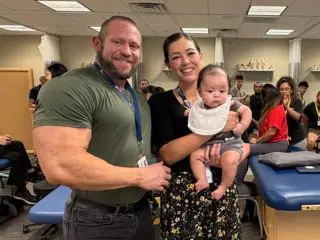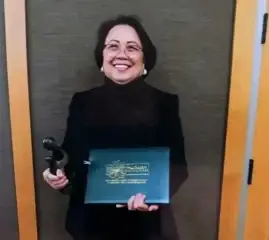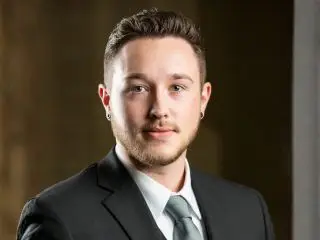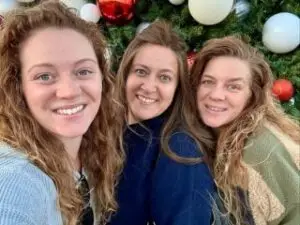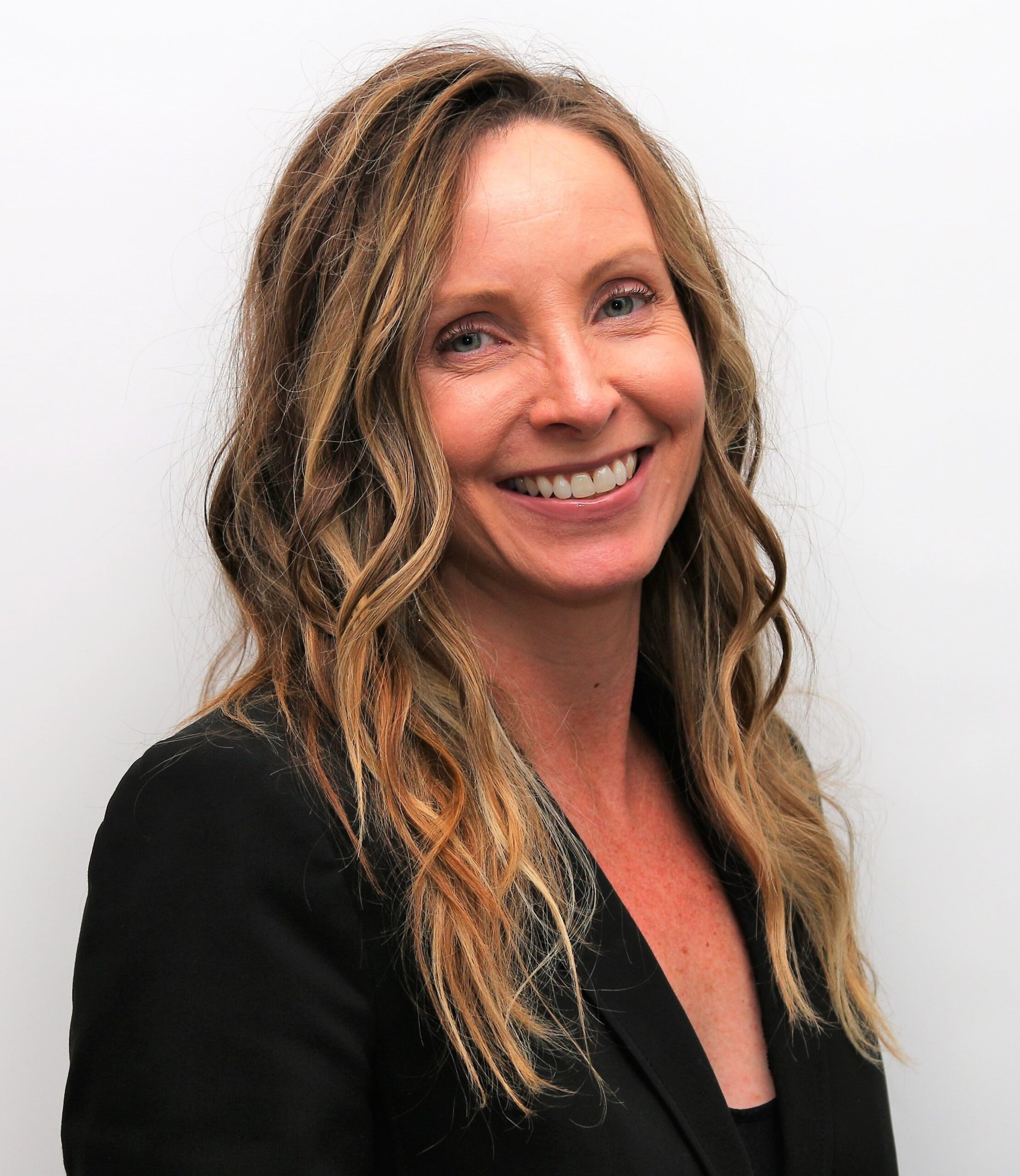 Please tell us about yourself.
Please tell us about yourself.
I moved to Sacramento on September 3, 2022, to work with Carrington College. I was Utah-born and raised, though I did live in Las Vegas, Nevada, for a while during my adulthood. I love the climate in California. My hobbies outside of Carrington College are working out via weight training and staying healthy. I have a daughter, whom I consider my greatest success in life. She is a senior in college in Tampa, Florida. She intends to take a gap year after graduating to study for the MCAT and apply to medical school. I’m incredibly proud of her.
How did you enter the field of dental hygiene?
I started by going through a Dental Assisting program as a senior in high school. I had most of my credits to graduate and needed something to do with most of my day. A friend and I decided to attend a Dental Assisting program provided via a local technical college offered to seniors in high school to earn college credit. After graduating and working as a dental assistant for several years, I attended Weber State University to earn a degree in Dental Hygiene. Months before entering the Dental Hygiene program, I was the victim of a drunk driving accident that nearly took my life; therefore, it took me a little longer to graduate than I initially expected. I received my Bachelor of Science from the same university with a minor in Health Administrative Services Instructional Development. I hadn’t planned on pursuing a bachelor’s degree, but one of my dental hygiene instructors encouraged me to finish since I only had two semesters remaining. I enjoyed working and getting my student loans paid off. At that time, the State of Utah contemplated opening a Dental Hygiene program at Salt Lake Community College. Many dental hygienists were fighting over opening another school in Utah so close to Weber State, which was less than an hour’s drive away. I supported opening another school because there was a shortage of dental hygienists, and our profession was also facing preceptorship becoming a threat in Utah.
What is preceptorship?
In the case of dental hygiene, it means a practicing dentist trains a person “on the job” to perform dental hygiene duties instead of requiring a two- or four-year formal, accredited education program and national and regional examinations to obtain a license.
That sounds very different from formal dental hygiene education.
It is. As I explained to a patient on the State Board of Regents at the time, a programmatically accredited Dental Hygiene program provides a much more comprehensive science and patient-focused curriculum than you would ever get from a preceptorship. The patient asked me to speak on Capitol Hill in Salt Lake City in support of opening another programmatically accredited Dental Hygiene. I was nervous, but I spoke to the State Board of Regents and explained the importance of programmatically accredited dental hygiene education. As I was leaving, the prospective program coordinator for the potential Dental Hygiene program at Salt Lake Community College tapped me on the shoulder and told me she liked my speech and appreciated the support. She wanted to know if I’d be interested in teaching for the school when or if it opened.
What did you tell her?
I told her yes! That was the serendipitous part of it. That happened right when I was going back to finish my bachelor’s degree. So, I was able to student teach. I earned my bachelor’s degree by developing the entire radiology portion of the new Dental Hygiene program at Salt Lake Community College in 1996.
Did radiology become your favorite subject to teach?
Radiology was something for which I was proficient, but I cannot say it was my favorite subject to teach. I enjoy teaching all courses in dental hygiene. There is also something about the autonomy of the clinic in a Dental Hygiene program that I enjoy teaching. Instructors are supervising and checking every skill, but the experience is different from being in class. In the clinic, a student can develop relationships with their patients and apply what they have learned. So, the clinic is also very different to teach, but also very enjoyable. I do love didactic instruction and will hopefully have the time to teach a class in one of the upcoming terms.
What did you do after getting your bachelor’s degree and starting to teach?
I worked full-time as a hygienist during the day and taught part-time at night for several years. I taught and practiced dental hygiene in Utah and Nevada, then became a mom, and almost immediately after, a single mom; so I moved back to Utah for family support while raising my child. Eventually, I became the Program Coordinator at Salt Lake Community College.
When did you decide you wanted to be a program director?
I was the Program Coordinator at Salt Lake Community College (SLCC) for six years before I decided to go to graduate school. I needed to attend graduate school as the Commission on Dental Accreditation (CODA) had changed the requirements for Coordinators/Directors of Dental Hygiene programs. Dental Hygiene programs would only have directors and they had to hold a master’s degree. So, I stepped down from that position and left to attend Westminster University’s Master’s in Public Health program full-time. I hoped to return to SLCC as program director, but they had hired someone else in the meantime, so it was time for me to move on to something else. I went on to work in public health for the next few years after graduate school.
Does that mean you were working in public health during the COVID-19 pandemic?
Yes, I was working for the State of Utah at the time as the State Opioid Response Academic Detailer and they recruited State of Utah employees to work overtime after hours to perform COVID-19 data collection. We were tasked to call individuals who tested positive for COVID-19 and ask them about their symptoms, length of illness, how many family members they were living with who also tested positive–things like that. It was an interesting experience.
When did you start at Carrington College?
I started on September 6, 2022, as the Dental Hygiene program Director in training. Carrington College had an Interim Program Director who was an instructor. I completed all the requirements to become licensed in California as a Registered Dental Hygienist and received my license the first week of January 2023; after that, I was able to start as the full-time Program Director.
What do you do as program director?
The Program Director of the Dental Hygiene program is directly responsible and accountable for ensuring the fulfillment of educational goals and objectives while ensuring program compliance, as well as maintaining programmatic accreditation through the Commission Dental Accreditation (CODA). The Carrington DH PD is also a major part of the cohort selection process, transcripts reviewing, and ranking for each incoming cohort of 30 students every 62 weeks.
How have your past experiences informed who you are as a program director?
I can empathize with students who may be struggling and understand how hard it is for them to go to school. As a student, I had to pay my way and work while I was in school. I didn’t always have the best grades–I was a good student, but I wasn’t a 4.0 student by any means. Because of the severe car accident that I was in at the beginning of my Dental Hygiene program, I understand health challenges. I had to have my entire face and jaw reconstructed through multiple surgeries during my two years of school and afterward. I also understand how difficult it can be to work, go to school, then go home and execute single-parent duties while not having all of the support that you need. I’m definitely not deskbound in my program director’s office, insulated and out-of-touch with what students are experiencing. As much as I can be, I think that I’m attuned to students and what they are going through in their lives.
What do you think Carrington College provides their students that they might not find elsewhere?
The student support services are excellent, and since it’s a smaller campus, students don’t fall through the cracks. When a student is missing a class, Carrington College jumps on it right away. They check in to ask what is wrong. They want to know, “Where are you?” and, “Is everything okay?” I like the fact that they have strong relationships with all the students. Carrington College stays on top of things to get every student through from start to finish and tries hard not to lose even one student, which I think is impressive.
Does your program provide support and encouragement for students who might need accommodations or assistance?
Yes, we do.
What do you enjoy most about your work?
I’m back where I’ve always wanted to be, working in dental hygiene education, supporting my colleagues, and helping to educate the next generation of hygienists. It’s exciting because it feels like I’m home. I was a dental assistant for 10 years and a dental hygienist for over 30. Hygiene has always pulled me back but never held me back. Education has been a big part of my path. One of my greatest rewards has been having students that I taught twenty years ago run up to me at dental conventions to say hello or send me emails letting me know they wouldn’t be where they are today without my help along the way.
Do you have any advice for people interested in attending Carrington College’s Dental Hygiene program?
Be prepared to dedicate a lot of your time to studying because this program is accelerated, which means it is fast and furious. Don’t be afraid to ask for help at school and from the people in your life. You’re going to need support while you are in the program. Also, make sure you are okay with the sight of blood and interacting with 8-10 different personalities per day once you become a practicing dental hygienist. That includes the dentist, dental assistants, and patients. They can be the most wonderful people or the most awful people and everything in between. No matter what, they will see you as a professional. I am confident that the Carrington College DH Program prepares our graduates for this role!
